
Hello! Welcome to Patient-Led Research Collaborative’s (PLRC) Quarterly Newsletter — this publication goes out four times a year to bring you the latest updates on PLRC’s work and critical updates on Long COVID and related conditions.
This issue covers:
- Patient-Generated Hypotheses Journal: Second Issue
- 2024 NASEM Long COVID Definition
- Long COVID Moonshot Update
- PLRC’s Feedback on NIAID Strategic Plan
- New Study on Long COVID Reinfections
If you have been forwarded this email and would like to continue to hear from us:
New Issue of Patient-Generated Hypotheses Journal
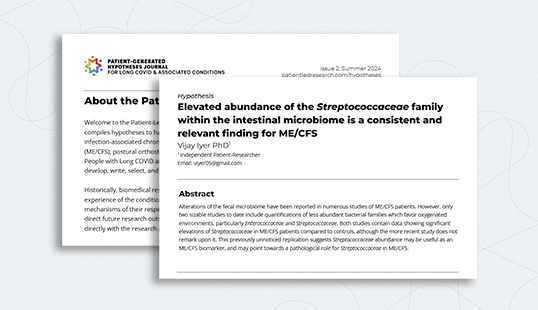
We are excited to present the second issue of the Patient-Generated Hypotheses Journal, which features four hypotheses by patients involving carbonic anhydrase activity, elevations of Streptococcaceae, chronic inflammation, and Bacillus Calmette–Guérin (BCG) vaccination.
We started the Journal in 2023 to compile hypotheses to hasten the discovery of mechanisms and treatments for Long COVID and infection-associated chronic conditions. People with Long COVID and associated conditions and caregivers of people with these conditions develop, write, select, and edit this Journal. Revisit the first issue here (May 2023).
“That seems to me like one of the reasons why the Patient-Generated Hypotheses Journal is such an important project, because it is a pathway to scribing these things” — Check out the Q&A in the Sick Times with contributing author Vijay Iyer discussing the latest issue.
We encourage you to share this widely and build upon our work!
New Long COVID Definition
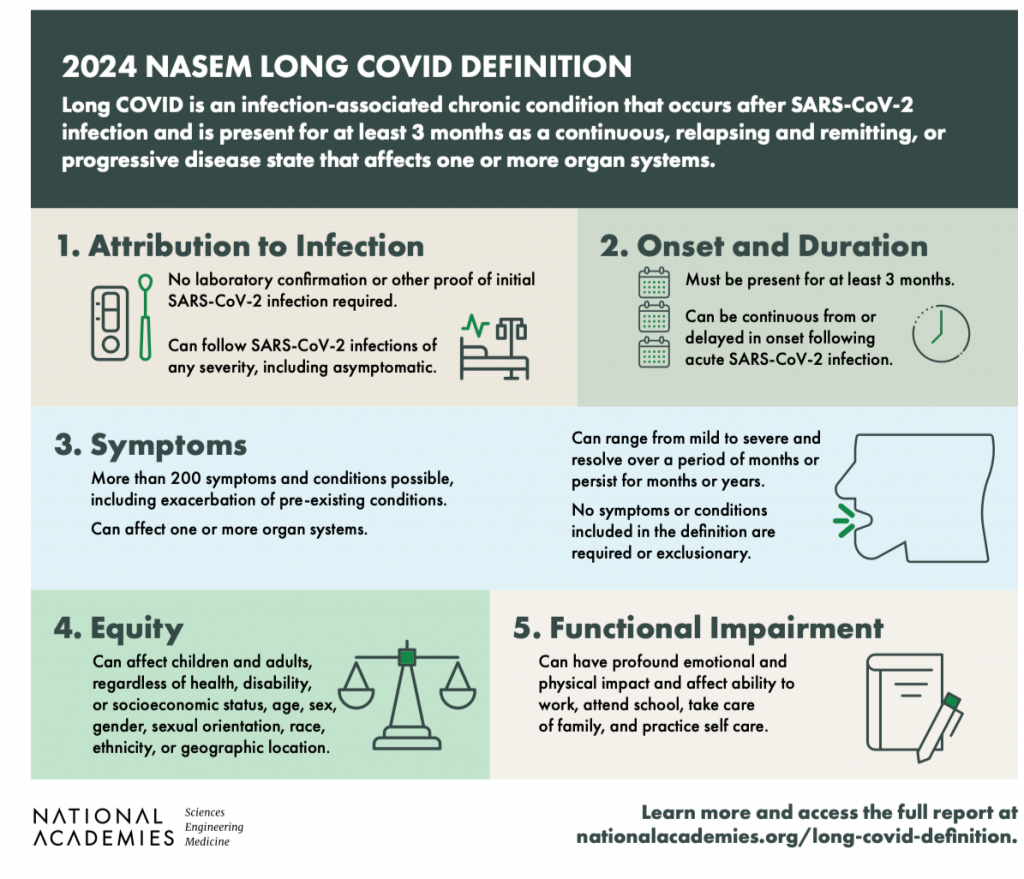
The National Academies of Sciences, Engineering, and Medicine (NASEM) recently released a report on the new consensus definition of Long COVID in an effort to promote consistency in diagnoses, aid awareness efforts, help patients access care and benefits, and harmonize Long COVID research and public health monitoring and regulations. This definition can be used in clinical care, public health policy, and gives researchers and healthcare workers both consistency and flexibility in studying Long COVID.
The 2024 NASEM Long COVID Definition reads: Long COVID is an infection-associated chronic condition (IACC) that occurs after SARS-CoV-2 infection and is present for at least 3 months as a continuous, relapsing and remitting, or progressive disease state that affects one or more organ systems. For the full definition, see the one-pager NASEM developed.
PLRC supports the adoption and use of the 2024 NASEM Long COVID Definition, and encourages people with Long COVID, as well as physicians, caretakers, and policymakers, to share this definition.
We believe the definition is a significant step forward in improving diagnoses and access to care through its comprehensive and operational description of disease presentations and natural history, along with the explicit acknowledgment that a positive COVID test is not required for a Long COVID diagnosis. By harnessing the expertise of IACC patient experts and researchers, the new definition and its report will also refine Long COVID and IACC research processes, including clinical trials.
Long COVID Moonshot — Latest Update
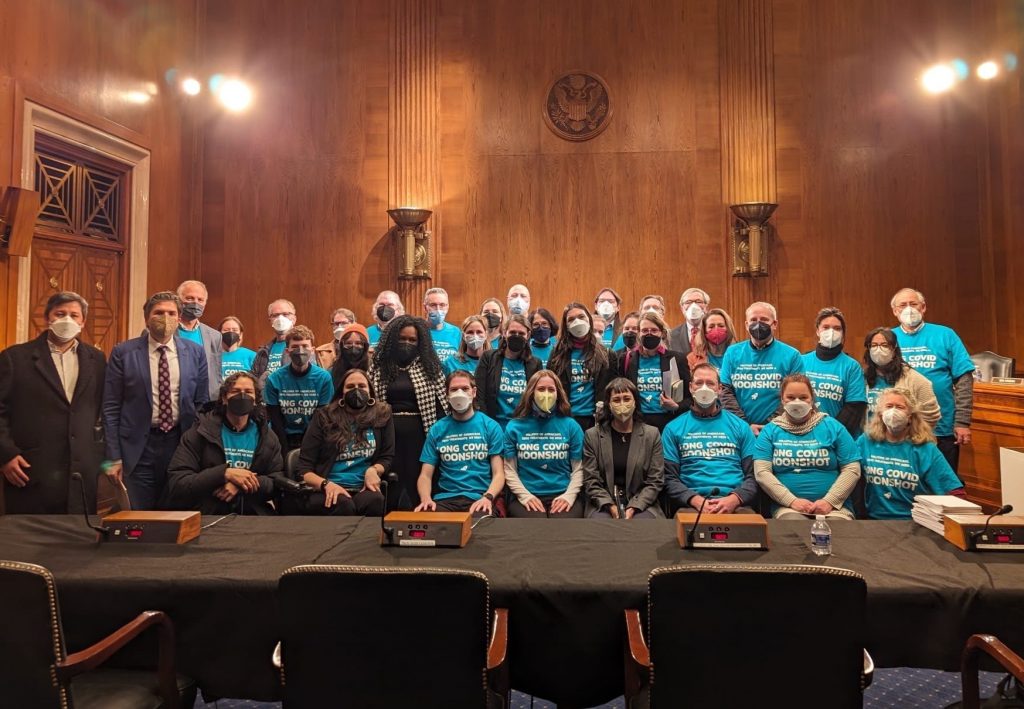
Last fall PLRC co-founder Lisa McCorkell authored an op-ed with Dr. Michael Peluso calling for a Moonshot for Long COVID – $1 billion/yr in funding for research for the next decade. Since then, the call has galvanized the community — including the founding of the Long COVID Moonshot organization — and caught the attention of policy makers on the Hill.
Earlier this year, Senator Bernie Sanders held the Senate hearing ‘Addressing Long COVID: Advancing Research and Improving Patient Care’, which featured patients, researchers and physicians echoing the call for a Moonshot. Shortly after, Senator Sanders’ office announced the Long COVID Moonshot draft legislative proposal to seek input from the community before formally introducing legislation. PLRC continues to work closely with Sanders’ office on this proposal; stay tuned!
In addition, together with the Long Covid Campaign and Long Covid Moonshot, PLRC worked with members of Congress this Spring to ensure there were budget requests for Long COVID funding for Fiscal Year 2025. An appropriations letter led by Senators Ed Markey, Tim Kaine, and Tammy Duckworth was signed by an additional 14 Senators and included the following requests: $1 billion in research funding for the NIH outside of RECOVER; $200 million to ARPA-H in high-risk, high-reward research funding; $20 million to the Office of Long COVID Research and Practice; and $13.5 million to AHRQ to continue their Long COVID Care Network.
PLRC Recommendations to NIAID’s Strategic Plan
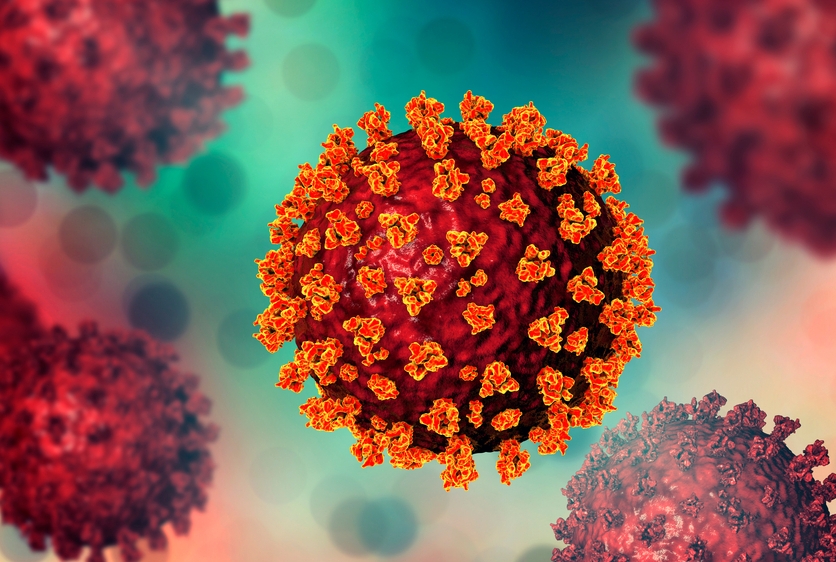
The National Institute of Allergy and Infectious Disease (NIAID) recently invited comments and suggestions on the Institute’s strategic plan, which will guide research priorities for the next 5 years. Following discussions with NIAID leadership, PLRC submitted a comment with our recommendations.
Under the leadership of Dr. Marrazzo (who was a RECOVER PI), and with NIAID’s background in studying HIV/AIDS, the Institute is primed to conduct and fund the type and level of research needed to study infection-associated chronic conditions and lead to breakthroughs and cures. In fact, some of the most prominent Long COVID researchers have backgrounds studying HIV/AIDS (e.g. Drs. Steven Deeks, Michael Peluso, and Tim Henrich at UCSF and Dr. Nancy Klimas at the Institute for Neuroimmune Medicine at NSU).
Our recommendations include (but are not limited to):
- Advance the understanding of the basic mechanisms of Long COVID pathogenesis, including enhancing knowledge of latent and the potential of persistently replicating COVID reservoirs.
- Develop and validate tools that allow for identification of viral persistence not only in the bloodstream but in tissue and other locations.
- Understand how chronic viral co-infections (e.g. EBV, CMV, HHV, Lyme) interact with the immuno-pathology of Long COVID and IACCs.
- Support clinical trials of immunomodulatory agents to treat Long COVID and myalgic encephalomyelitis.
Study Launched to Understand Impact of Reinfections Over Time
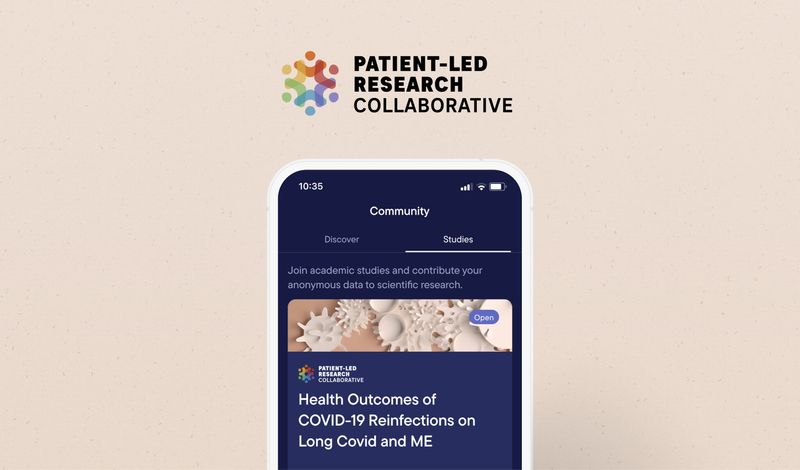
It’s long been reported by people with Long COVID and myalgic encephalomyelitis (ME/CFS) that new acute infections, including COVID infections, can have a significant impact on long-term symptoms.
We recently partnered with Visible on a new in-app research study to understand how reinfections affect baseline symptoms of people with Long COVID and ME/CFS.
With more than 60,000 people with energy-limiting illness already tracking symptoms and biometrics with Visible every day, there is an unprecedented opportunity to use a comprehensive dataset to answer crucial questions like:
- How frequent are reinfections for those living with long-term symptoms?
- What is the impact of these reinfections on symptoms and recovery?
- What is the impact of reinfections on menstrual cycle health?
If you’d like to participate in the Visible study, you can opt-in to share your anonymized data with PLRC from within the Visible app. Simply go to the Research section in the Community tab to enroll.
This collaboration with Visible follows up on PLRC’s Reinfection survey, which analyzes at one time point how reinfections are associated with Long COVID and other health outcomes. Stay tuned for our first paper from that survey coming soon!
Read, Listen, Watch & More
- Listen: Podcast with PLRC co-founder Hannah Davis and the Think Queen, Kyne
- Read: New study on promoting equity, diversity, and inclusion in Long COVID surveys, co-authored by PLRC co-lead Dr. Letícia Soares and member Dr. Beth Stelson
- Survey: Help inform clinical trial research by sharing your Long COVID treatment experience with FDA Cure ID survey
- Read: Q&A with The Sick Times on PLRC Hypotheses Journal
- Watch: Remission Biome round table on T-Cell activation in ME/CFS & Long COVID with PLRC representatives Dr. Megan Fitzgerald & Rivka Solomon
- Watch: Take a look in my Long Covid Body, by PLRC member Ezra Spier
Your donations support our work to conduct research and advocate for policies that enable patients to survive and thrive.
In solidarity,
Team PLRC
PS. Please reach out to team@patientledresearch.com to collaborate with our team or sponsor future Journals.
